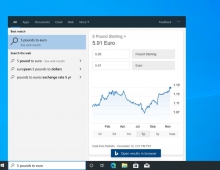
Bing Launches More Intelligent Search Features
Microsoft continues to advance the intelligent search features of its Bing search engine, powered by Artificial Intelligence.
In December, the company announced new intelligent search features which tap into advances in AI to provide people with more comprehensive answers, faster.
Since then, the company has made improvements to the current features, and has also added new scenarios that get you to your answer faster.
Specifically, Bing now aggregates facts for given topics across several sites, so you can save time by learning about a topic without having to check several sources yourself. For example, if you want to learn more about tundras, simply search for "tundra biome facts" and Bing will give you facts compiled from three different sources at the top of the results page.
An enhancement to Bing's intelligent answers rolling out this week gives you insight into unfamiliar topics at a glance. When Bing recognizes a word that isn't common knowledge, it will now show you its definition when you hover over with the cursor.
Bing will also show you a variety of answer options in one place so it will be easier to decide which is best for you. Having multiple answers is helpful in situations where you may struggle to write a specific enough query, such as when you have DIY question but may not know the right words to ask. In the next few weeks, Microsoft will be shipping answers for how-to questions.
Another new feature announced in December is intelligent image search, which allows you to search within an image to find similar images and products. With intelligent image search, you can manually select a desired object by manually cropping around you if you like, but Microsoft's built-in object detection feature makes this easier by identifying these objects and highlighting them with clickable hotspots so all you have to do is click to get matching results.
Delivering intelligent search requires tasks like machine reading comprehension at scale, which require immense computational power. So, Microsoft built it on a deep learning acceleration platform, called Project Brainwave, which runs deep neural networks on Intel Arria and Stratix Field Programmable Gate Arrays (FPGAs) on the order of milliseconds.
Intel's FPGA chips allows Bing to quickly read and analyze billions of documents across the entire web and provide the best answer to your question in less than a fraction of a second. Microsoft says that Intel's FPGAs have enabled the company to decrease the latency of its models by more than 10x while also increasing our model size by 10x.





















